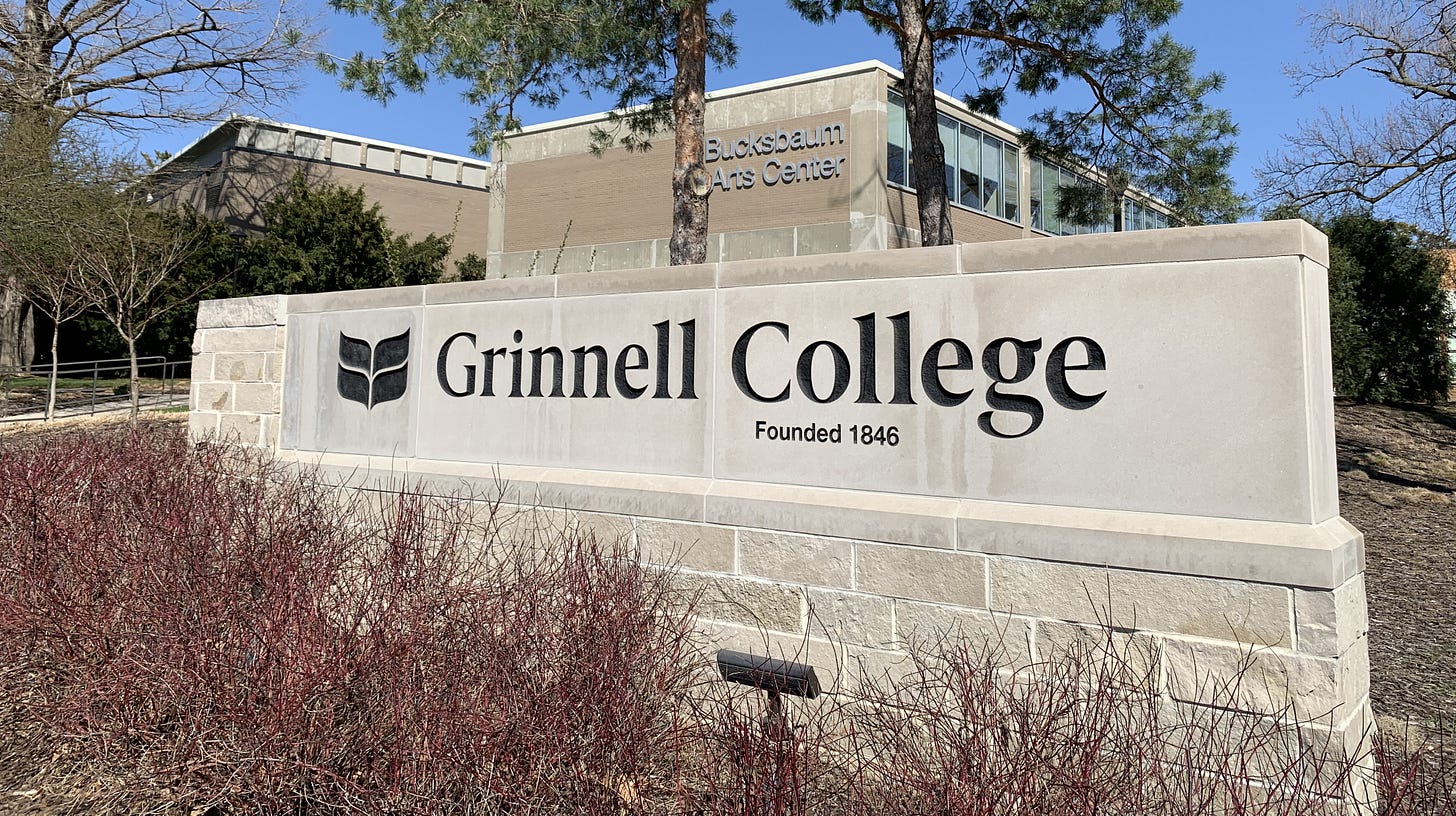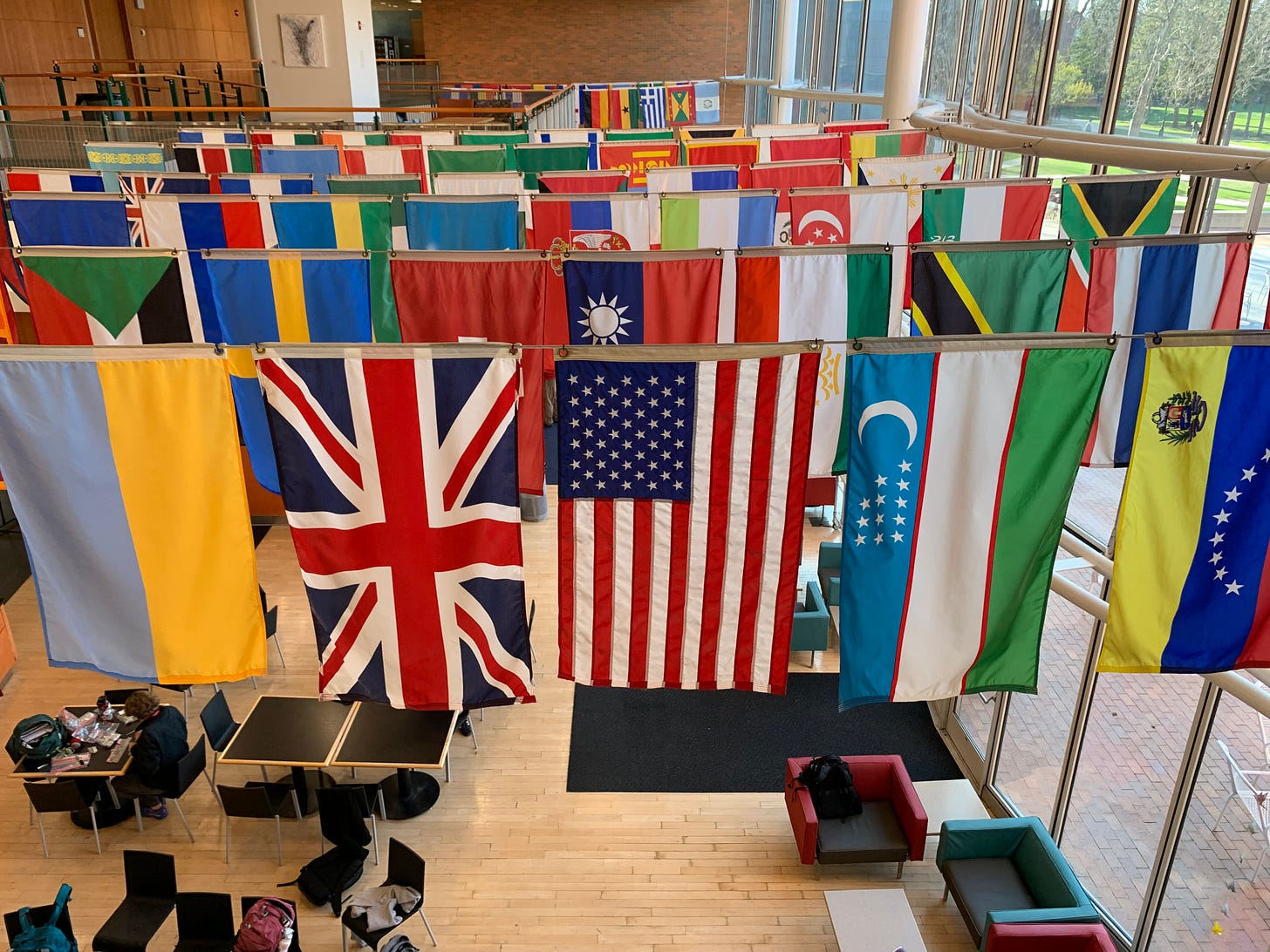Political playbook says attack the elites
At least that's how Iowa's Republican Party chair tried to frame his response to a story about Democratic Party contributions from an Iowa college
(Photo by Lyle Muller)
I was reading get well cards this past week, the result of a fall that sent me to a hospital with three broken ribs and a nasty knock on the head (no sympathy sought nor necessary), when I got to this one from a friend:
“Hope your fall didn’t start with - ‘Hey, watch this.’”
It did not. But, a lot of what people like to pass off as wisdom sure seems to be nothing more than an unserious “hey, watch this” statement. I have to stifle my laughter at it because pain pills don’t work well enough to keep my ribs from hurting.
This happened most recently when Grinnell College’s Scarlet & Black newspaper published a story by one of its talented reporters, Thai Theodoro, who wrote that more than 98% of the political donations college employees have made the past 10 years went to Democrats.
In one way, that’s astounding, given that Poweshiek County is strongly Republican. Donald Trump carried the county with 57.4% of the 10,013 votes cast for president in 2024. In another way, though, Democratic support from people working at a college known as having a liberal bent and diverse student body should be no surprise, even if the level of support reported might be.
A 2023 study College Pulse did for the Foundation for Individual Rights and Expression, or FIRE, showed that 71% of students responding from Grinnell College identified as “somewhat” or “very” liberal and one-half of the respondentes called themselves a strong Democrat.
The survey was conducted Jan. 13 to June 30, 2023 with 55,000 students from more than 250 colleges. Its margin of error was plus or minus 2 to 5 percentage points for specific colleges and plus or minus one percentage point for all 55,000 students surveyed. You can read about that poll in an award-winning story by then-Scarlet & Black reporter Nina Baker. Nina is at the Quad-City Times now.
Anyway, back to the story about Democratic campaign donations. Iowa Republican Party Chairman Jeff Kaufmann responded for the story:
"The blatant biased partisanship of the Grinnell faculty does not surprise anyone. What is sad is that I'm guessing it creeps into all of their classrooms under the guise of academic freedom. This is not higher education -- it is biased education."
He’s guessing. At least he admitted it.
That’s a problem with political critics of higher education. They use stereotypes based on guesses for their party’s gain. Its a classic attack on an entity they want to paint as elite for political gain. It is not about Grinnell. It is about any college or university that gets in the crosshairs of those who like to beat on what people learn at the institutions. It is why Republicans in the Iowa Legislature zeroed in on diversity, equity and inclusion at the three state universities this year.
Yes, critics can come up with students who feel they are being indocrinated when learning something that goes against what they had been led to believe, or when someone argues strongly that they are wrong when they state an opinion. But plenty of examples also exist of students opening their eyes in college to things they never knew and expanding their world view exist. Plus, there’s this matter of learning to discern the truth through critical thinking, even when challenged and when arguing back during debates.
Guessing what goes on somewhere, like a college classroom, is a common practice by those who like to toss verbal fire bombs designed to tear down an institution’s credibility.
Ellen de Graffenreid, Grinnell College’s vice president of communications and marketing, responded for the Scarlet & Black story to maintain her college’s credibility. She said the college follows American Association of University Professors in 1940 guidelines that protect faculty rights to discuss subjects in classes freely and separate personal political views from instructional information. She also reminded the story’s readers that faculty and staff have the same rights as others to participate in politics and vote according to their beliefs.
Interestingly, one of my favorite professors at the University of Iowa — translation, liberal place, but not as liberal as some who have not been there think — was a staunch conservative who tore apart arguments made by liberal speakers. He did so in intellectual, challenging and interesting ways. We stayed in touch until he died. He worked in retirement on raising support for the local library.
In 2012, I found myself wanting to be in one of Republican Newt Gingrich’s West Georgia University history classes because his recitation of political history when he campaigned for president during The Gazette editorial board I attended in Cedar Rapids was interesting. Nevermind the criticisms of his time in academia, his unbridled ambition, his flaws, and conservative politics. I got to ask the man in the room where it happened who balanced the federal budget and built a surplus in the 1990s during the Clinton administration. Himself, for forcing the budget through Congress, he said, but also Clinton, in part, for his work, Gingerich begrudingly said.
Universities and colleges have been accused for decades of being liberal slop holes. Vietnam War protests and Nixon Administration assaults on academia, as well as the media, in the late 1960s and into the 1970s, helped define Nixon before the Watergate scandal forced him to resign.
“The New Left won in the universities,” John Coyne Jr., former speech writer for disgraced, former Vice President Spiro Agnew, lamented almost 50 years ago in a 1975 essay. “They didn’t destroy the universities, but they demonstrated to the nation just how bankrupt the universities were, and by so doing they forced them to commit public suicide.”
Certainly, colleges and universities are imperfect and they affect what students learn by teaching subjects that interest their faculty members, albeit those selected by the college because of the skill with which they teach a subject. Moreover, evidence from the College Pulse/FIRE study confirms that colleges with strong acceptance rates of liberal students, Grinnell among them, proliferate in the United States.
However, Snopes, the online myth-busting organization, looked at available literature and concluded that the political leanings and basis for them among college students are not as straightforward as others might want to think. “Many factors must be considered about a person's life experience that could impact political viewpoints, but those same factors could also determine whether a person attends higher education in the first place,” the Snopes piece stated.
LINK TO ASSOCIATED PRESS ADDED MAY 9, 2025:
Most Americans disapprove of Trump’s treatment of colleges, a new AP-NORC poll finds
Kaufmann was right about the strong, left-leaning politics of people working at Grinnell. Students I work with tell me about that, and also imperfections at the place.
But bias in the name of academic freedom? Puh-leeze. More like serving a diverse campus where almost one of every five students is from one of the more than 50 countries sending students to central Iowa. More like serving a place where one of every four students from the United States is a person of color, enlightening those attending the college and benefitting the city of Grinnell economically and culturally.
The Gallery of Flags hanging over Grinnell College’s Spencer Grill represents all of the countries sending students to the well-respected central Iowa liberal arts college. (Photo by Lyle Muller)
The discernable fear among GOP leaders is that colleges will spit out too many liberal thinkers with whom conservatives must deal. They equate learning a lot of things in college, especially uncomfortable truths about this nation, will make too many people liberal. After all, exit polls taken in November showed that college-educated people favored Kamala Harris over Donald Trump for president.
So, here are some thoughts. Determine the real reasons students chose to attend colleges that have liberal-leaning tendancies, students feel threatened by those who criticize their opinions, colleges that accept an overwhelming number of liberal-leaning students do so, and college-educated people voted more for Democrats than for Republicans in 2024. Then, come up with solutions that not only improve educational experiences,but which appeal to people who have them.
If only it were that simple. Somehow, I feel like I just said, “Hey, watch this.”
Lyle Muller is a retired Iowa journalist who still works as an independent contractor and professional adviser for Grinnell College’s Scarlet & Black newspaper. His views are his own and do not reflect those of any official at Grinnell College or the institution.
A University of Iowa graduate, he is board member of the Midwest Center for Investigative Reporting and Iowa High School Press Association, a trustee of the Iowa Freedom of Information Council, former executive director/editor of the Iowa Center for Public Journalism that became part of the Midwest Center, and former editor of The Gazette (Cedar Rapids). He is a recipient of the Iowa Newspaper Association’s Distinguished Service Award, Iowa College Media’s Association’s Eighmey Award, and Iowa Newspaper Association’s Stratton Award.





